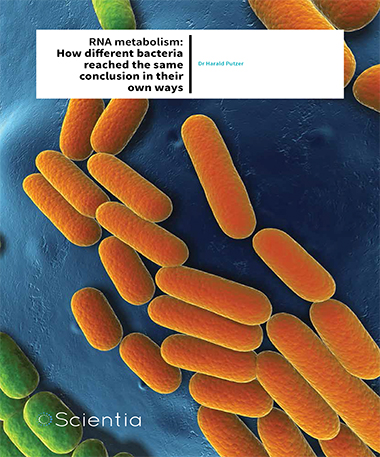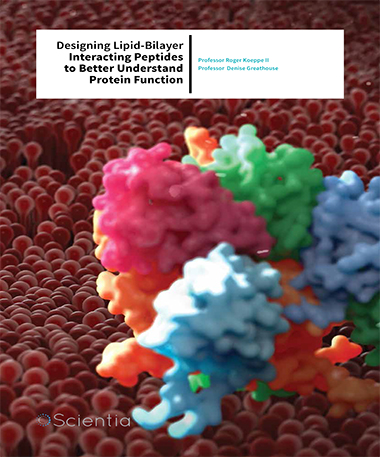Life Sciences & Biology

Soapbox Science
Soapbox Science was founded as a public outreach platform for promoting women scientists and their research. Now in its seventh year, Soapbox Science takes female scientists out of the lab and onto the streets, to talk to the passing, unsuspecting public about...

Dr Diliana D. Simeonova – Deciphering Unknown And Unrecognised Phosphorus-Microbial Transformations
Dr Diliana D. Simeonova and her colleagues at the Bulgarian Academy of Sciences, Institute of Microbiology in Sofia, Bulgaria perform research at the interface between geochemistry and microbiology – or simply geomicrobiology. Dr Simeonova and her colleagues are...

Professor Stephen Goff – Contagious Cancer Cells In Shellfish
Professor Stephen Goff of Columbia University studies transmissible cancer in shellfish. His interest in viruses and their role in cancer led him to initially research a potential viral cause for leukaemia that is present in shellfish. The cancer did not have a viral...

Professor Arthur Devries – Cold As Ice: Antifreeze Proteins In Polar Fishes
Professor Arthur DeVries of the University of Illinois is the discoverer of anti-freeze proteins in polar fishes, which enable them to survive and thrive in polar environments, where they would otherwise freeze to death. This unique adaptation forms a cornerstone of...

Professor Helmut Segner – Shrinking Fish Stocks: The Effect Of Environmental Sex Hormones On Immunity
The size of fish catches from rivers has reduced to alarming levels in many countries. Professor Helmut Segner of the University of Bern in Switzerland is studying the reasons why fish stocks might be dwindling. His research focusses primarily on the effect of sex...

Professor Gordon Taylor – Marine Microbes Shed Light On Our Changing Oceans
Climate change and anthropic interactions with the oceans are making marine habitats increasingly unsuitable for marine animal life. This is why researchers like Professor Gordon Taylor at Stony Brook University are working to understand the complex dynamics governing...

Dr Craig Albertson – Beyond Genetics
Dr Craig Albertson and his colleagues at the University of Massachusetts, Amherst conduct research in evolutionary developmental (evo-devo) biology. The team’s research focus is at the intersection of genes, development and evolution, using the craniofacial skeleton...

Dr Bettina Sonntag – Unseen Worlds: Microscopic Lake Plankton Fuel Food Chains And Befriend Algae
Dr Bettina Sonntag investigates ciliates – microscopic organisms living in freshwater lakes. As a senior scientist at the Research Institute for Limnology in Mondsee, Austria, Dr Sonntag leads a research team exploring how these single-celled protists interact with...

Professor Nicola Aceto – Fighting Metastatic Cancer One Clump Of Cells At A Time
Professor Nicola Aceto studies how circulating cancer cell clusters work with an eye on novel treatments for cancer patients with the most deadly disease—metastatic cancer. How did you come to work at the Cancer Metastasis Lab at the University of Basel, Switzerland?...

Dr Daniel Heath – Growing Better Salmon: Balancing Economics With Environmental Impact
Aquaculture – growing fish or other aquatic species in captivity – is an important strategy for meeting the increasing demand for seafood from a growing human population, while also preserving wild fish stocks. However, aquaculture can also have negative environmental...

The U.S. Department Of Agriculture’s National Institute Of Food And Agriculture
An exclusive interview with Dr Sonny Ramaswamy, the director of the National Institute of Food and Agriculture (NIFA) As one of 18 agencies within the United States Department of Agriculture (USDA), the National Institute of Food and Agriculture (NIFA) is the...

Professor Daniel Szymanski – Math Plus Biology: Building A Knowledge Base To Engineer Plant Traits
Novel research seeks to unravel one of the most complex mysteries of plant biology and pave the way toward better, denser crops, under the careful guidance of Professor Daniel Szymanski at Purdue University. Looking into Leaf Growth Trapped within a thick canopy...

Professor Daniel John Jackson – How Animals Fabricate Biominerals
Professor Daniel J. Jackson and his team at the University of Göttingen use snails and sponges as models to study how animals make biominerals, and to gain insight into how this ability first evolved. The cellular and molecular mechanisms that allow an animal to make...

Professor Suzie Currie – Coping With Stress In An Aquatic World
As high temperatures continue to set records around the globe, aquatic organisms are facing new environmental extremes. Freshwater and marine animals will either adapt to resulting changes in salinity, temperature and oxygen, or face mortality and possible extinction....

The Society For Developmental Biology – Choose Development! Increasing Diversity In Developmental Biology
The Society for Developmental Biology is successfully increasing the diversity of undergraduates wishing to pursue careers in developmental biology through a programme called Choose Development! Lack of diversity in science A 2011 report published by the National...

Dr Mirjam Knörnschild – Bats In Translation
Dr Mirjam Knörnschild and her group at the Free University Berlin study the acoustic communication and social behaviour of wild bats to understand the evolutionary interplay of social and vocal complexity, the functional significance of culturally transmitted song...

Professor Allen J. Moore – Uncovering The Evolutionary Origins Of Parental Care
Parental care is relatively uncommon in the animal kingdom, and most young are left to fend for themselves at birth. However, parenting behaviours have evolved multiple times in the history of life and are seen in diverse groups of animals. In recent years, biologists...

Professor Paul Dent – A Versatile Antiviral Drug With Potential From Ebola To Hiv
Professor Paul Dent, of Virginia Commonwealth University, has conducted extensive research into the potential of AR-12, a small molecule drug, to act as a versatile antiviral agent. The drug exploits clever targeting of ubiquitous chaperone proteins, leading to...

Dr David Greenberg – The Genetics Of Epilepsy
Searching for disease-causing genes is no simple task. Dr David Greenberg has been studying the genetic determinants of inherited epilepsy for 30 years and explains how the search can be hampered by deeply ingrained, but incorrect, assumptions within the field....

The American Society For Biochemistry And Molecular Biology
Representing over 12,000 members worldwide, the American Society for Biochemistry and Molecular Biology (ASBMB) has been advancing the fields of biochemistry and molecular biology for the last 100 years. Over the next few pages we have had the pleasure of speaking...

Professor Seamas Donnelly | Dr Ciaran O’reilly – Translational Medicine: Fundamental Research, Drug Discovery And More!
Professor Seamas Donnelly and Dr Ciaran O’Reilly are currently working together in a cross-disciplinary team, uncovering the role of macrophage migration inhibitory factor in inflammation and cancer, and investigating promising small molecule therapeutic approaches....

The Biotechnology And Biological Sciences Research Council
The Biotechnology and Biological Sciences Research Council (BBSRC) is one of seven Research Councils that work together as Research Councils UK (RCUK). BBSRC invests in world-class bioscience research, with the goal of tackling major challenges such as lessening the...

Dr Heiko Reutter – Studying Congenital Human Malformations Caused By Too Many Genes
Genetics researcher Dr Heiko Reutter and his colleagues at the Institute of Human Genetics of the University of Bonn, Germany, think that some congenital malformations of the uro-rectal area, oesophagus and trachea are caused by too many copies of genes that govern...

Dr Jing He – Using Advanced Computational Techniques To Derive Protein Structures From 3d Cryo-Electron Microscopic Images With Insufficient Resolution
Scientist Dr Jing He and her colleagues at Old Dominion University in Virginia use advanced computational techniques to interpret 3-dimensional electron microscopic images of frozen proteins to determine their 3-dimensional structures. The World of Molecular...

Professor Elizabeth Adkins-Regan – Social Behaviour In Birds: What Makes Them Tick?
Professor Elizabeth Adkins-Regan of Cornell University investigates the physiological mechanisms underlying social and reproductive behaviour in birds, including the life-long bonds formed by monogamous pairs, parental behaviours and the influence of parents on...

Professor Arlan Richardson – Growing Old Gracefully: The Science Behind Aging
Professor Arlan Richardson and his colleagues at the University of Oklahoma Health Sciences Center investigate the biological mechanisms behind aging. Professor Richardson is specifically interested in the effects of aging and dietary restriction on gene expression,...

Rebecca Tallmadge, Phd | Maria Julia Bevilaqua Felippe, Mv, Ms, Phd – Antibodies, Epigenetics, And A Bit Of Hay
Dr Julia Felippe and Dr Rebecca Tallmadge of Cornell University’s College of Veterinary Medicine are attempting to understand the complex world of the equine immune system. We talk to them about their discoveries and plans. Imagine a gingerbread house, tall as a...

Dr Harald Putzer – Rna Metabolism: How Different Bacteria Reached The Same Conclusion In Their Own Ways
Dr Harald Putzer at the Institut de Biologie Physico-Chimique, France, investigates how bacteria regulate the expression of genes by degrading their transcripts with RNase enzymes, and how organisms separated by billions of years of evolution, figured out how to do it...

Professor Roger Koeppe & Professor Denise Greathouse – Designing Lipid-Bilayer Interacting Peptides To Better Understand Protein Function
Professors Roger Koeppe II and Denise Greathouse at the University of Arkansas design and study peptides that interact with model biological lipid-bilayer membranes. They are interested in understanding the protein-lipid molecular interactions that are responsible for...

Professor Joyce Van Eck – Improving Crops By Genetic Engineering And Targeted Genome Editing
Located at the Boyce Thompson Institute, an independent affiliate of Cornell University, the Van Eck lab explores novel methods for major crop improvement possibilities offered by a powerful gene editing method called CRISPR/Cas9. Portrait of a bioengineer Professor...

Professor Christine Theoret – The Horse As A Model For The Study Of Human Wound Healing Disorders
Professor Christine Theoret at the University of Montreal studies dermal fibroproliferative disorders in horses with the aim of reducing financial and welfare impacts on the equine industry. The results of her work may also be carried over to the field of human...

Dr Donald J. Vander Griend – Uncovering Genetic Pathways to Prostate Cancer
Dr Donald Vander Griend and his research team at the University of Chicago have devoted the last few years to investigating novel gene pathways which underlie prostate cancer development and progression, as well as the factors leading to treatment resistance and...
